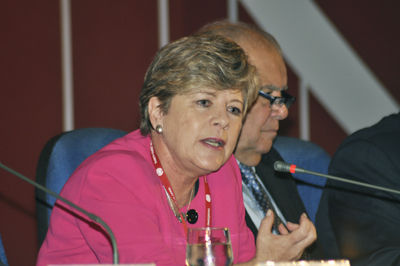ECLAC Proposal on the Role of the State in Attaining Equality is Discussed at High-level Seminar
Work area(s)
Participants stressed the importance of regional integration and strengthening democracy for the adoption of effective public policies.

(Brasilia, 31 May 2010) Government representatives and prominent international experts participating in the Thirty-third Session of the Economic Commission for Latin America and the Caribbean (ECLAC) discussed today the Commission's proposals set forth in its document Time for Equality. Closing Gaps, Opening Trails.
The main working document in the meeting was presented by ECLAC Executive Secretary Alicia Bárcena during a high-level seminar attended by government officials and representatives of ECLAC member States and international bodies.
Bárcena stressed the need to establish a new fiscal covenant and redefine the equation State-market-society to reposition long-term policies focused on equality pursuant to economic growth that may mitigate volatility, strengthen productivity by closing gaps, universalize rights and social services, foment inclusion in the labour market and achieve greater territorial convergence.
In a video greeting, the President of the Dominican Republic, Leonel Fernández, valued the proposals of the ECLAC document and said that the problems of inequality and poverty continue to be very important in the region. He also underscored the need to increase people's access to social rights.
During the first part of the seminar, Marco Aurélio Garcia, Special Advisor to the Presidency of Brazil on International Affairs, considered that the document's proposals "systematize post-neoliberal thinking and emphasize social issues."
Garcia explained that Brazil's foreign policy favors the creation of a big regional market. In spite of the crisis, he said, "the region has enjoyed growth levels and processes of social inclusion that have created real conditions for a big Latin American and regional market."
Enrique Iglesias, Secretary General of the Ibero-American General Secretariat (SEGIB), stated that as a result of the global crisis, ideas and paradigms are being revised in a quest for new development models.
Three basic issues the international community should pay attention to arise from the ECLAC document: the importance of politics for the construction of this new model, the redefinition of regional cooperation strategies and the revision of world governance to address the challenges of the redistribution of power centers.
The Secretary General of the Organization of American States (OAS), José Miguel Insulza, stressed the issue of deepening democracy as a pillar of equality. "To achieve this, we have to address the enormous problems of poverty and inequality that persist in the region," he said.
Insulza also noted the importance of regional integration and said that the more active role for the State proposed by ECLAC in the document will be an issue for discussion in the future.
"A bigger State will not lead to patterns of growth with equality if we don't strengthen democracy first," stated Nicolás Eyzaguirre, Director of the Western Hemisphere Department of the International Monetary Fund (IMF).
What is really needed, he added, is a new international financial architecture. "There is a huge problem with the international regulation of capital flows. The financial sector cannot be isolated; that would be naïve," stated Eyzaguirre.
During the first session of the high-level seminar, the ECLAC document was also examined by Maurice Odle, Economic Advisor to the Secretary General of the Caribbean Community (CARICOM), Heraldo Muñoz, Assistant Administrator and Director of the Regional Bureau for Latin America and the Caribbean of the United Nations Development Programme (UNDP), and Salvador Beltrán del Río, Undersecretary for Latin America and the Caribbean of the Secretary of Foreign Affairs of Mexico.
During the afternoon session, the Minister of Foreign Affairs of Brazil, Celso Amorim, stated that the challenge ahead is the consolidation of a new paradigm for development based on a successful combination of growth with equality.
The principle of growth for equality and equality for growth, as ECLAC has said, has been the guiding principle behind the efforts of the government of President Luis Inácio Lula de Silva, said Amorim.
Amorim highlighted two main issues: the role of the State in reducing economic and social inequality and covering what the market doesn't reach, with programmes such as Bolsa Familia and Luz para Todos, and through initiatives like these, the possibility of expanding the domestic market and injecting more dynamism in the consumer economy.
"I can confirm with satisfaction that President Lula's foreign policy is following the same route signaled by ECLAC: opting for renewed regional integration and in pursuit of equality, not just within our countries but also between them," Amorim concluded.
The document Time for Equality. Closing Gaps, Opening Trails is available on the website of the Thirty-third session of ECLAC.
For enquiries and interviews, contact ECLAC's Public Information and Web Services Section, dpisantiago@cepal.org; telephones: (56-2) 210-2040/2149. Mobile phones: (56 9) 88390573, (56-9) 7967-8306, (56-9) 8839-0576.
Related content
La hora de la igualdad. Brechas por cerrar, caminos por abrir
Presentación de Alicia Bárcena, Secretaria Ejecutiva de la CEPAL, en el Trigésimo tercer período de sesiones de la CEPAL. Brasilia, Brasil, 31 de mayo de 2010.
Country(ies)
- Latin America and the Caribbean
Contact
Public Information Unit
- prensa@cepal.org
- (56 2) 2210 2040